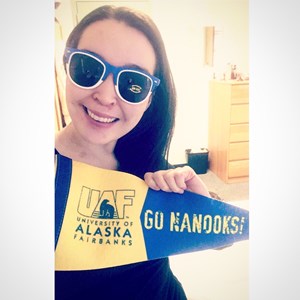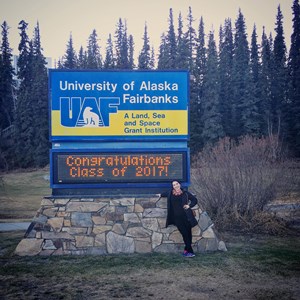Through education my world started to expand: first going to high school in Aasiaat, 1400 km south from Qaanaaq, and then another 600 km south to the University of Greenland in Nuuk. Since then I have completed one year of voluntary work in Germany, an internship in the Danish Parliament in Copenhagen, one semester in the University of Alaska Fairbanks and one in the University of Akureyri in Iceland, and summer schools in Lithuania and Columbia University, New York. I’ve also participated in Inuit Circumpolar Council’s (ICC) capacity-building course for Inuit and Sámi youth – a three-year project to learn about indigenous rights and Arctic policies – during which I had the chance to participate in meetings of the Arctic Council, the United Nations Permanent Forum on Indigenous Issues in New York, and the Expert Mechanism on the Rights of Indigenous Peoples in Geneva, Switzerland.

UArctic’s north2north program gave me the opportunity to reconnect with brothers and sisters across the Arctic. We Inuit live in four different countries and don’t have much connection with each other in everyday life. It had been a dream of mine to visit other Inuit homelands and other indigenous peoples since I was a child, so I was grateful for the opportunity to do a one-semester exchange at the University of Alaska Fairbanks.
What surprised me was that in my program all the professors, except for one, were natives. In Greenland I’ve only had one native Greenlandic professor during my whole university education, even though compared to other indigenous homelands we are the majority in our country. This gave me an opportunity to actually get
insight from an indigenous academic perspective. As an Arctic indigenous citizen and social science student, the most important thing is to look at things from different points of view.
It was also so cool that they have an indigenous leadership program for native students. If I may give critique to my own university, we maybe have a too westernized way to teach and learn, even though the majority are native Greenlanders. The way we can change that is to be more inclusive, help students go abroad and learn how other universities do things, and then be part of changing their own for the better.
It hurts to know that many of my friends have no education, no secure jobs, and an insecure future. What we lose as a community are jobs, more freedom in life, opportunities for better life, knowledge who can lift up the communities, people who can help with development, and so on. The ICC held an education summit in Nuuk in 2018, and the numbers show that only 40% of our students continue with education. That number is even lower for remote communities like my hometown where I was the only one from my class in primary school to go further to secondary school and for a university degree. “It’s not the young people who are failing in education, but the education system failing the students,” as I heard someone say at the UArctic Congress. I think that statement is very true in Greenland as well.
Our Minister of Education at that time was saying that earlier we have been looking south when trying to find better practices for our education system, but we should start looking east and west to other Arctic nations to find systems that are better suited for the Arctic. And I think UArctic is a good way to do that.

I hope more students will take the opportunities out there. If language skills are what is stopping you, remember that you will never learn if you don’t try. My native tongue is Inuktun, the smallest language group in Greenland, and so different from other dialects that very few outside my hometown can understand me. Through education and exchange, I have learned Kalaallisut, Danish, English, German, Iñupiaq and Icelandic, even though I am not perfect in any of them. But I still try, and that is why I am here today – because I try, and I keep trying.
I am about to be finished with my Master’s thesis and have already started working in my dream job at Inuit Circumpolar Council, an indigenous NGO and also a Permanent Participant of the Arctic Council. I hope to work here for a really long time, maybe even for the rest of my life.
Originally published in the UArctic Shared Voices Magazine 2019
